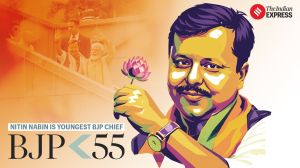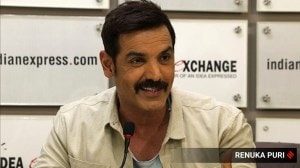Perry replugged
Was it just a year ago that TIME pronounced India8217;s prime minister to be 8216;Asleep at the wheel8217;? At that time, British journal...

Was it just a year ago that TIME pronounced India8217;s prime minister to be 8216;Asleep at the wheel8217;? At that time, British journalist Alex Perry8217;s scathing take on the Indian PM set off many ripples in this country.
Perry wrote of a prime minister who fell asleep during cabinet meetings, was prone to 8216;8216;interminable silences8217;8217; and 8216;8216;indecipherable ramblings8217;8217;, had a weakness for fatty food, enjoyed a nightly whiskey or two and a three hour afternoon snooze, forgot names of colleagues. Wondered Perry, then: 8216;8216;As India and neighbour Pakistan put up their nukes, is an ailing and frail Vajpayee the right man to have his finger on the button?8217;8217; That was in June, 2002.
Well, a year on, Perry has done a spectacular rethink. Now, it is the opposition Congress party that is 8216;8216;asleep on its benches8217;8217;. And Atal Behari Vajpayee is 8216;8216;Top of His Game8217;8217;. He is even 8216;8216;Asia8217;s new comeback kid8217;8217;.
Having made up his mind to change his mind, Perry is unstoppable: Vajpayee has never been so well-received abroad, he writes breathlessly, and his star has never been higher at home. He has clinched a 8216;8216;landmark deal8217;8217; with China, is 8216;8216;expending political capital8217;8217; trying to make peace with Pakistan, has 8216;8216;quashed8217;8217; a 8216;8216;leadership challenge8217;8217; within his own party, is boldly trying to solve Ayodhya.
In 2003, Perry writes of a man trimmer of figure and a leader who has recommandeered India8217;s political agenda. This year, Perry has discovered in Vajpayee a 8216;8216;mystique8217;8217; and 8216;8216;appeal8217;8217; that enables a 8216;8216;regal rise above India8217;s noisy democracy8217;8217;.
The Best case scenario
What should I do?8217;8217; Zaheera Sheikh recalls asking herself, 8216;8216;Should I stick to my testimony or should I save my family8217;s lives by saying something different?8217;8217; This week, the WASHINGTON POST framed Sheikh8217;s cruel dilemma. In the end, it noted, she chose the latter option. And that neither the prosecutor nor the judge even asked why she changed her testimony.
The paper caught up with the star witness of the high-profile Best Bakery Case in Mumbai. She was influenced to change her story, said Sheikh, by the 8216;8216;indifference8217;8217; of prosecutors who 8216;8216;made no effort to contact her before the trial8217;8217;.
Emperor Bush8217;s African safari
The President of the United States went to Africa this week and the western media dutifully spotlighted that continent.
THE NEW YORK TIMES earnestly broke up the African monolith into the countries Bush was scheduled to set foot on. It even separated out their specific problems: Senegal, troubled by a low-grade separatist insurgency. South Africa, where government has failed to confront one of the biggest HIV-AIDS pandemics. Botswana, cursed with Africa8217;s highest HIV infection rate. Uganda, where opposition parties and free elections are not permitted. Nigeria, saddled by corruption, army human rights abuses, and festering religious and ethnic divisions.
The GUARDIAN hailed the first steps made by a sitting Republican president on African soil. In its reckoning, 8216;8216;For this act alone, Mr Bush deserves credit8217;8217;. Also in the GUARDIAN, Saskia Sassen, professor at the London School of Economics, shrugged off the prose about US challenges and Africa8217;s despair. Bush8217;s visit is about horsetrading, she said. 8216;8216;Bush wants access to oil and the installation of US military bases and troops to make the region secure against terrorism8230; In return, Bush is offering aid for AIDS victims and enhanced access to US markets.8217;8217; But lurking in the fine print on the offer of US market access is the fact that benefits for African producers are neutralised by the distortions from US government subsidies to its farmers.
What Africa really needs, the ECONOMIST agreed, is sharp cuts in rich countries8217; farm subsidies. It pointed out that these are even higher in Europe. 8216;8216;The average European cow attracts more subsidy than the average African farmer earns8230;8217;8217;
Back to the future
In Egypt8217;s AL AHRAM WEEKLY, Galal Amin, professor of economics in Cairo, wrote about the rewriting of textbooks by the US in Iraq. In the name of reform and for cleansing Iraqi schoolbooks of the personality cult of Saddam Hussein.
For Amin, both the reform and the reformer were suspect. Because, 8216;8216;8230; Americans have created in their own country an educational system that does very little to encourage critical and independent thinking8230; One of the underlying assumptions of US educational theory is that dictatorship, hegemony and repression emanate only from the state, and that the solution to all such ills is to reduce the role of the state. This assumption is deeply flawed8230;8217;8217; Also, because classes will be largely conducted in foreign languages, at the expense of Arabic.
Once an American style education system is put in place, argued Amin, the range of choices available to the Iraqis will be seriously diminished.
- 01
- 02
- 03
- 04
- 05































